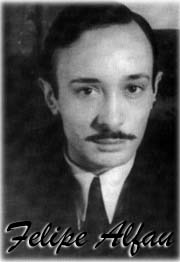| home
| navigation |
|
text only version of article From the novel Locos: Prologue | Identity |
|
 Felipe Alfau: Felipe Alfau: A Retrospective by Jill Adams .
|
|
| Introduction Last year I learned that Dalkey
Archive Press had published a Spanish writer, born in Barcelona in 1902, whom neither I
nor anyone I knew had ever heard of. Who is this Felipe Alfau, I wondered, who seemed to
pass unknown in his native city? Thanks to Dalkey Archive, I’ve since learned a great
deal about Alfau, whose oeuvre consists of two novels (Locos: A Comedy of Gestures
[1936] and Chromos [1990], the latter nominated for the National Book Award), which
comprise the major works; a poetry collection (Sentimental Songs: La poesía cursi
[1992]); and a book of children’s stories (Old Tales from Spain [1929]). If
the publishing dates look odd, that is because, I've learned, Alfau languished in
obscurity for over fifty years, at which point Dalkey Archive sought to set things aright.
I’ve learned this too: that he is everything the book jackets boast - a writer far
ahead of his time, using techniques that would later be "discovered" by such
postmodernists as John Barth, Donald Barthelme and Thomas Pynchon; that he is a
mesmerizing storyteller; that he has lived most of his life in New York and written in
English except for the poetry; that he is still alive as of this writing, living in a
retirement home in Queens; that there are those who know of him in Barcelona
although few; and that although he is recognized here, it is not surprising that Barcelona
hasn’t gone out of its way to claim him as a native son, given that he is a
self-proclaimed Franquista, who goes so far as to claim that the
devastation of Guernica during the civil war was sheer communist fabrication. He supports
the Machiavellian idea of tyranny over democracy, the only two options possible in the
world. And he is, god help us, an anti-Semite (a fact he denies, but those who know him
claim is true) and not too keen on blacks or Hispanics either. He is, at 97 anyway, a
crusty old curmudgeon with hardly any appreciable views. Still . . . there are those
novels.
© 1999 The Barcelona Review |
|